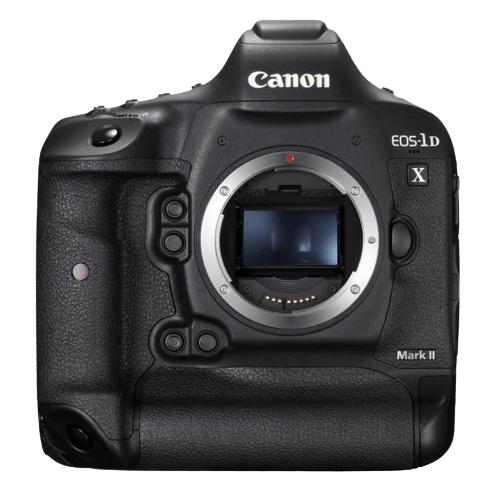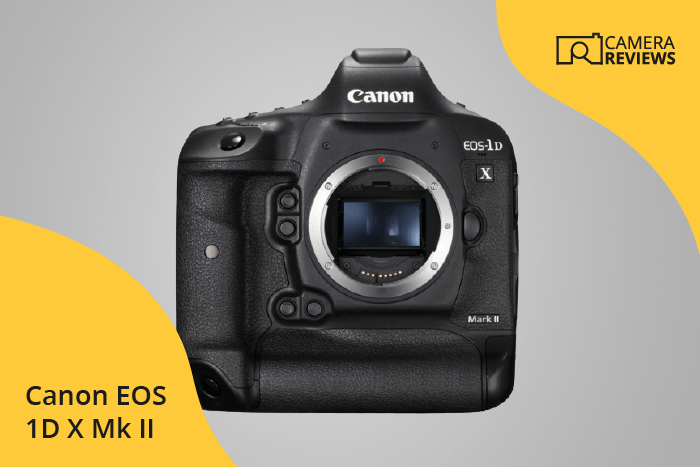Canon EOS 1D X Mark II Specs and Scores

The Canon EOS 1D X Mark II scores a solid 73 out of 100 in our evaluation. This DSLR camera was announced on February 2, 2016, and released the same year with a launch price of $6000. Measuring 158 x 168 x 83mm and weighing 1530g (3.37lbs), this camera has been on the market for a few years now.
Despite its age, the 1D X Mark II still holds its own in today’s competitive market. Its specifications remain relevant and reliable for various photography needs. This camera proves that quality can withstand the test of time.
Canon EOS 1D X Mark II Overview and Optics
The Canon EOS 1D X Mark II receives a score of 72/100 for its optics. With 20.2 megapixels, a shooting speed of 16 frames per second, and a Dual DIGIC 6+ processor, this camera delivers high-quality images. The CMOS sensor has a DXOMARK score of 88, which is a reliable indicator of image quality. The full-frame sensor size allows for better low-light performance and a wider field of view.
The Canon EF lens mount provides compatibility with a vast range of lenses, giving photographers flexibility in their shooting options. However, the camera lacks built-in image stabilization, which may require the use of stabilized lenses for optimal results. The 3:2 aspect ratio is standard for most DSLRs and offers a natural balance between width and height.
Despite some limitations, the Canon EOS 1D X Mark II’s optics are competitive in today’s market. This camera is suitable for photographers seeking high-quality images and a wide selection of compatible lenses.
Canon EOS 1D X Mark II Video Performance
The Canon EOS 1D X Mark II holds a video score of 69 out of 100. This camera offers 4K video resolution with dimensions of 4096 x 2160 and a maximum frame rate of 60fps. Compared to other cameras in the market, these specifications provide high-quality video recording, ensuring crisp and smooth footage.
However, the lack of built-in time-lapse functionality may be a drawback for those seeking this feature. Despite this, the Canon EOS 1D X Mark II still proves to be a strong contender in the realm of video capabilities, with its impressive resolution and frame rate providing users with excellent video performance.
Canon EOS 1D X Mark II Features and Benefits
The Canon EOS 1D X Mark II’s features score stands at 74/100. This camera boasts a 3.2-inch touchscreen display with a resolution of 1620000 dots. The presence of GPS allows users to geotag their images with ease. However, it lacks modern connectivity options like Wi-Fi and Bluetooth, which might be a drawback for some users.
Comparing its features to other cameras in today’s market, the 1D X Mark II’s touchscreen and GPS are definite advantages. These features make it user-friendly and convenient for photographers who need to track their shooting locations. However, the absence of Wi-Fi and Bluetooth connectivity puts it at a disadvantage when it comes to seamless file transfers and remote shooting capabilities.
Considering all these factors, the Canon EOS 1D X Mark II offers a mix of useful features and some limitations. While it excels in certain aspects, the lack of modern connectivity options might be a deal-breaker for some potential buyers.
Canon EOS 1D X Mark II Storage and Battery
The Canon EOS 1D X Mark II achieves a storage and battery score of 79/100. This camera offers two memory card slots, accommodating both Compact Flash and CFast 2.0 cards, providing flexibility for users to choose the storage format that best suits their needs. The battery life of this camera allows for 1210 shots, which is adequate for extended shooting sessions. Powered by an LP-E19 battery, it does not support USB charging.
In the current market, the Canon EOS 1D X Mark II’s storage and battery specifications fare well, offering users a dependable and versatile storage and power solution. The combination of two memory card slots and decent battery life make it a reliable choice for photography enthusiasts and professionals alike.
Canon EOS 1D X Mark II Alternatives
Do you want to know how the Canon EOS 1D X Mark II compares to its competitors? Have a look at the most popular comparisons for this camera below:
- Canon EOS 90D vs EOS 1D X Mark II
- Canon EOS 1D X Mark II vs EOS 5D Mark IV
- Canon EOS 1D Mark IV vs EOS 1D X Mark II
- Canon EOS 1D X Mark II vs EOS 1D X Mark III
- Canon EOS 1D X Mark II vs EOS 80D
- Canon EOS 1D X Mark II vs EOS 1D X
Canon EOS 1D X Mark II FAQ
Does the Canon EOS 1D X Mark II Have Built-in Image Stabilization?
No, the Canon EOS 1D X Mark II does not have built-in image stabilization. However, it is compatible with Canon’s IS lenses, which provide stabilization to reduce camera shake.
Does the Canon EOS 1D X Mark II Support 4K Video Recording?
Yes, the Canon EOS 1D X Mark II supports 4K video recording at up to 60 frames per second, providing high-resolution and smooth video footage for professional results.
What Size Sensor Does The Canon EOS 1D X Mark II Have?
The Canon EOS 1D X Mark II features a full-frame 20.2-megapixel CMOS sensor, which provides excellent image quality and low-light performance for professional photography.
Does the Canon EOS 1D X Mark II Have a Dual Memory Card Slot?
Yes, the Canon EOS 1D X Mark II has a dual memory card slot, supporting both CFast 2.0 and CompactFlash cards, which allows for flexible storage and backup options.
Does the Canon EOS 1D X Mark II Have a Touch Screen?
Yes, the Canon EOS 1D X Mark II features a 3.2-inch touch screen LCD, which allows for easy navigation of menus and settings, as well as touch focus during Live View shooting.
Does the Canon EOS 1D X Mark II Have Wi-Fi and Bluetooth?
No, the Canon EOS 1D X Mark II does not have built-in Wi-Fi or Bluetooth connectivity. However, it is compatible with the optional WFT-E8A Wireless File Transmitter for Wi-Fi functionality.
Does the Canon EOS 1D X Mark II Have GPS?
Yes, the Canon EOS 1D X Mark II has a built-in GPS receiver, allowing for geotagging of images and tracking the camera’s location during shoots.
Is the Canon EOS 1D X Mark II Weather Sealed?
Yes, the Canon EOS 1D X Mark II is weather sealed with a durable magnesium alloy body, providing protection against dust, moisture, and harsh shooting conditions.
Does the Canon EOS 1D X Mark II Have a Built-in Flash?
No, the Canon EOS 1D X Mark II does not have a built-in flash. However, it is compatible with Canon’s range of external Speedlite flashes for versatile lighting options.

